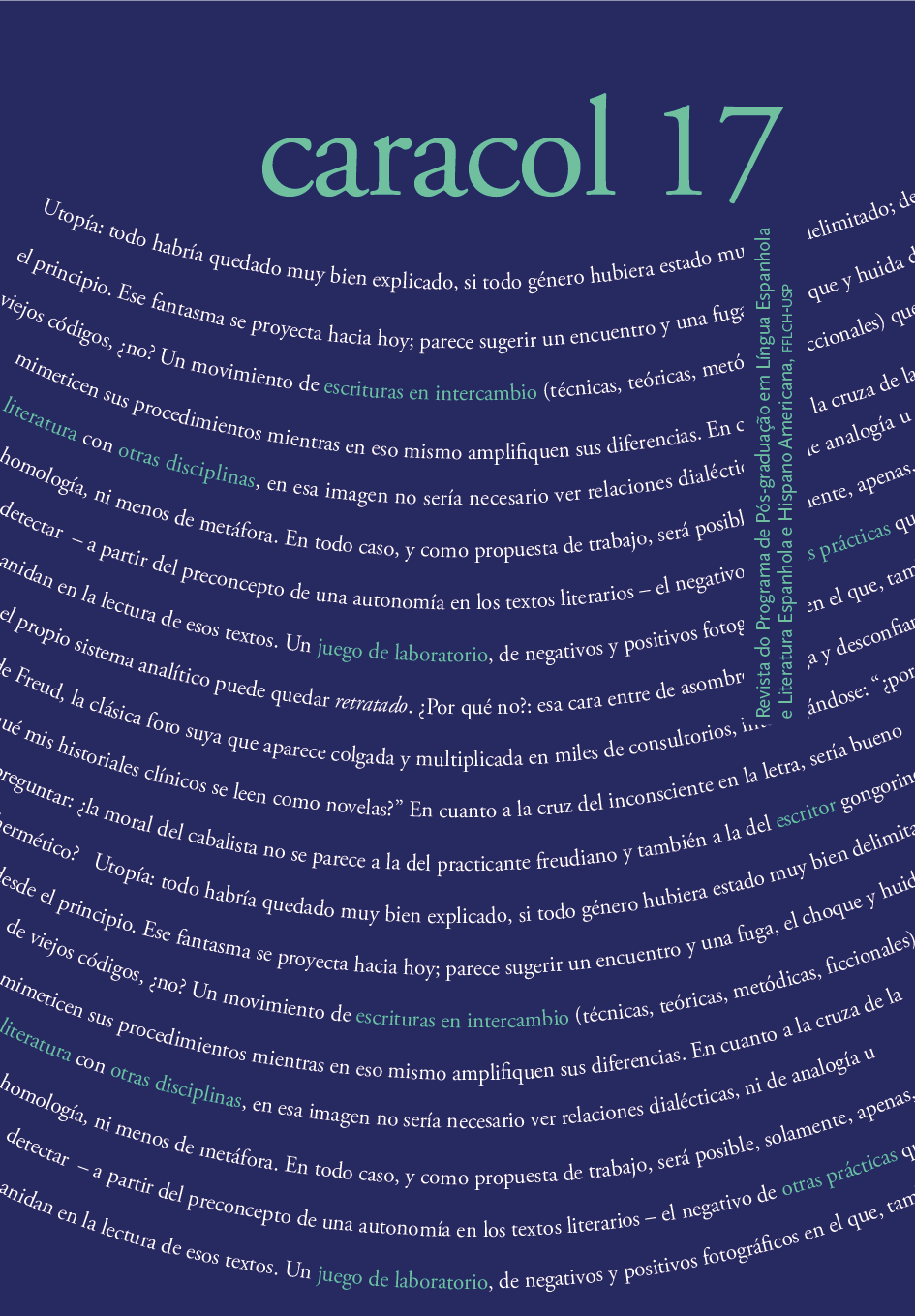Ejemplaridades errantes. El celoso extremeño (1613) y Penélope (1959)
DOI:
https://doi.org/10.11606/issn.2317-9651.v0i17p535-560Palavras-chave:
ejemplaridad, arte poética, enfermedad mental, silencioResumo
En sus Novelas ejemplares, Cervantes inaugura un género de narrativa de ficción, la novela corta, vertiendo a una nueva configuración los modelos consagrados de la novela y resignificando la estética y el lenguaje canónicos de su tiempo. Dalton Trevisan actualiza e intensifica ese hacer poético en sus Novelas nada ejemplares, reconfigurando los ejemplos errantes de las tradiciones literarias, estéticas y socioculturales. Este artículo trae el estudio comparado de dos cuentos por medio del análisis de su composición como narrativas ejemplares, a partir de algunos rasgos estructurales y del examen de las relaciones de género. En el ámbito de las relaciones humanas, figuradas artísticamente, interesa observar cómo la autoridad masculina y la sumisión femenina se justifican, considerándose los valores en boga cuando las obras fueron publicadas. Es notable que Cervantes y Trevisan representan matrimonios dañosos en ingeniosas tramas que censuran las prácticas culturales de su tiempo.
Downloads
Referências
Burton, Robert. Anatomía de la melancolía (1620). Prólogo y selección de Alberto Manguel. Madrid: Alianza, 2011.
Cervantes Saavedra, Miguel de. “El celoso extremeño”. In: Novelas amorosas y ejemplares (1613). Ed. F. Sevilla Arroyo; A. Rey Hazas. Madrid: Espasa Calpe, 1991, v. 2, p.357-396.
González Pagés, Julio César. Macho, varón, masculino. Estudio de masculinidades en Cuba. La Habana: Editorial de la Mujer, 2010.
León, Fray Luis de. La perfecta casada (1583). 9. ed. Madrid: Espasa-Calpe, 1968.
Santa Biblia. Antigua versión de Casiodoro de Reina y Cipriano de Valera. London: Trinitarian Bible Society, s/d.
Sevilla Arroyo, Florencio; Rey Hazas, Antonio. Edición, introducción y notas. In: Cervantes Saavedra, Miguel de. Novelas ejemplares (1613). 30. ed. Madrid: Espasa Calpe, 1993.
Souza, Marina G. Sampaio de. Economia Doméstica. 8. ed. São Paulo: Editora do Brasil, 1959.
Speranza, Graciela. Atlas portátil de América Latina. Arte y ficciones errantes. Barcelona: Anagrama, 2012.
Trevisan, Dalton. “Penélope”. In: Novelas nada exemplares (1979). 6. ed. Rio de Janeiro: Record, 1994, p.170-175.
Vives, Juan Luis. Formación de la mujer cristiana (1523). In: Obras completas. Ed. Lorenzo Riber. Madrid: Aguilar, 1947, p.985-1175.
Waldman, Berta. Mínimo múltiplo: del cuento al haikú de Dalton Trevisan. Traducción de María del Consuelo Rodríguez. Revista de la Universidad. México. Disponible en:
http://www.revistadelauniversidad.unam.mx/ojs_rum/files/journals/1/articles/14441/public/14441-19839-1-PB.pdf Acceso en: 24 sep. 2018.
Downloads
Publicado
Edição
Seção
Licença
Copyright (c) 2019 Rosângela Schardong

Este trabalho está licenciado sob uma licença Creative Commons Attribution-NonCommercial 4.0 International License.
Autores que publicam nesta revista concordam com os seguintes termos:
- Autores mantêm os direitos autorais e concedem à revista o direito de primeira publicação, com o trabalho simultaneamente licenciado sob a Licença Creative Commons Attribution que permite o compartilhamento do trabalho com reconhecimento da autoria e publicação inicial nesta revista.
- Autores têm autorização para assumir contratos adicionais separadamente, para distribuição não-exclusiva da versão do trabalho publicada nesta revista (ex.: publicar em repositório institucional ou como capítulo de livro), com reconhecimento de autoria e publicação inicial nesta revista.
- Autores têm permissão e são estimulados a publicar e distribuir seu trabalho online (ex.: em repositórios institucionais ou na sua página pessoal) a qualquer ponto antes ou durante o processo editorial, já que isso pode gerar alterações produtivas, bem como aumentar o impacto e a citação do trabalho publicado (Veja O Efeito do Acesso Livre).




